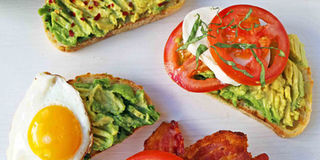Healthy butter substitutes to try

If you insist on eating animal foods, eat plenty of white meats such as rabbit, poultry, fish and sea foods.
What you need to know:
If you want to cut your calories intake, butter is probably one of the things you want to get rid of. However, finding a healthier alternative that is also tasty is easier said than done. These few choices might just help.
Butter is one of the commonest dairy products made from churned milk or cream with salt and food colour added sometimes. It is often used at room temperature as a spread, melted as a condiment, and used as an ingredient in baking, sauce making, pan-frying, and other cooking procedures.
Research shows that it is high in saturated fat and calories. According to Amanda Twebaze, a nutritionist, one should use butter in moderation or instead replace it with healthier options.
Plant-seed oils
She says one can use oils from seeds and nuts such as palm oil, coconut oil, sunflower seed oil, for food preparation instead of butter and margarine.
“These oils have lots of unsaturated fat, which is a healthy fat. It protects one from heart diseases, high blood pressure and diabetes. They also contain vitamin E which is anti-ageing but also an anti-inflammatory nutrient for the body helping it fight inflammation. Olive oil, avocado oil and coconut oil are ranked healthy in that respective order,” she says.
The oils are best for light frying food, stewing sauces, basting foods in the oven, lining baking tins, an alternative to butter in some baking recipes and salad dressings.
Pumpkin purees
These contain high amounts of fibre, which works against constipation and hunger pangs. They also contain lots of zinc, which is important for the proper functioning of enzymes and hormones in our bodies. The consistency of the puree also makes it easier to digest countering bloating and indigestion.
Twebaze recommends that the pumpkin puree is best used as is to help when having light meals, on a fluid diet or feeding the elderly or young ones trying to get introduced and used to eating solid foods. You can also use the puree to make a soup, creamy dessert instead of butter.
Greek yoghurt
Greek yoghurt can be used in smoothies, salad dressing and making dips. She says: “Greek yoghurt has some quantity of live bacteria making it a good probiotic food which helps us cleanse our colon, fight infections along the digestive tract. The protein it contains helps to rebuild torn and worn out muscles, calcium strengthens our bones and its fat content enables us to have a skin glow, protect inner body organs.”
Avocado
Since avocado is naturally cholesterol-free, you can use it for spreads, toppings and dips. They are very nutritious and a healthier alternative to saturated fat such as margarine and other animal fat.
Lilian Nyanzi, a nutrition research associate at Africa Innovations Institute, says it is always important to limit the amount of animal food sources and replace them with plant-based foods such as groundnuts.
Ghee
Some people may think that ghee is a better option but Lilian Nyanzi, a nutrition research associate at Africa Innovations Institute, remarks that ghee and butter are both derived from cow’s milk and their nutritional profiles and fat content are very similar.
“Ghee is made by melting unsalted butter. Upon heating, the butter separates into liquid fats and milk solids. The milk solids are then removed to remain with the liquid fat. When cooled, this forms ghee. However, ghee has a higher boiling point and lesser lactose levels than butter,” she says.
All fats that take a solid form at room temperature are saturated fats that are considered not safe for use and unhealthy for the heart because they are high in cholesterol.




